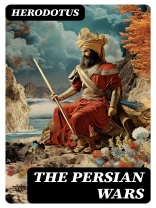In ‘The Persian Wars, ‘ Herodotus, often dubbed the ‘Father of History, ‘ intricately weaves narratives detailing the conflicts between the Greek city-states and the expansive Persian Empire during the 5th century BCE. Written in a captivating prose that blends historical account with rich storytelling, Herodotus employs a method that combines ethnography, personal anecdote, and critical inquiry, effectively capturing the complexity of human motivations behind the warfare. The text not only serves as a chronicle of epic battles, such as those at Marathon and Thermopylae, but also reflects on cultural exchanges, providing insights into the contrasting worlds of Persia and Greece. Its contextual significance lies in the exploration of democracy, freedom, and the human spirit in the face of tyranny, making it a foundational work in the field of historiography. Herodotus was born in Halicarnassus around 484 BCE and traveled widely through the known world, gathering stories that would later inform his writing. His experiences with diverse cultures and political systems engendered a unique perspective that allowed him to portray not merely events, but the human experience underpinning them. This empirical pursuit of understanding the past, characterized by a commitment to the verifiability of accounts, was groundbreaking for his time, laying the essential groundwork for future historians. For contemporary readers, ‘The Persian Wars’ remains an indispensable exploration of conflict and cultural identity, offering profound insights not only into the historical events of the era but also into the universal themes of courage, power, and resilience. Whether approached as a historical document or as a work of literary art, this text invites readers to reflect on the enduring legacy of these ancient struggles, making it a vital addition to the library of anyone interested in history or literature.
Sobre el autor
Herodotus, often referred to as ‘The Father of History’, was an ancient Greek historian born in Halicarnassus, a Greek city in Asia Minor, around 484 BC. Influenced by the wider Greek literary tradition and the monumental events of his time, Herodotus developed a historiographical approach characterized by a broad geographical and cultural curiosity. His magnum opus, ‘Histories’—often called ‘The Persian Wars’—is a pioneering work laying the foundation for Western historical writing. In this tome, Herodotus chronicles the Greco-Persian Wars, blending historical fact with myth and legend to provide a narrative that explores the causes and events of the conflicts between Greece and Persia. His method of systematically collecting materials, critically examining them, and arranging them into a coherent narrative was innovative for his time. His storytelling prowess is evident in the vivid character sketches and the attention to the customs and cultures of various peoples he encountered. Although sometimes criticized for his inclusion of fanciful tales and unverifiable anecdotes, his work remains a crucial source for understanding the ancient world. Herodotus’s literary style, which manifested an engaging prose rich in digressions and ethnographic descriptions, served as both a historical record and compelling reading for his contemporaries and for posterity. His influence is seen not only in history but also in the fields of anthropology and geography. Herodotus’s enduring legacy is that of a trailblazer who turned history into a narrative art form, preserving the memory of human events for future generations.












